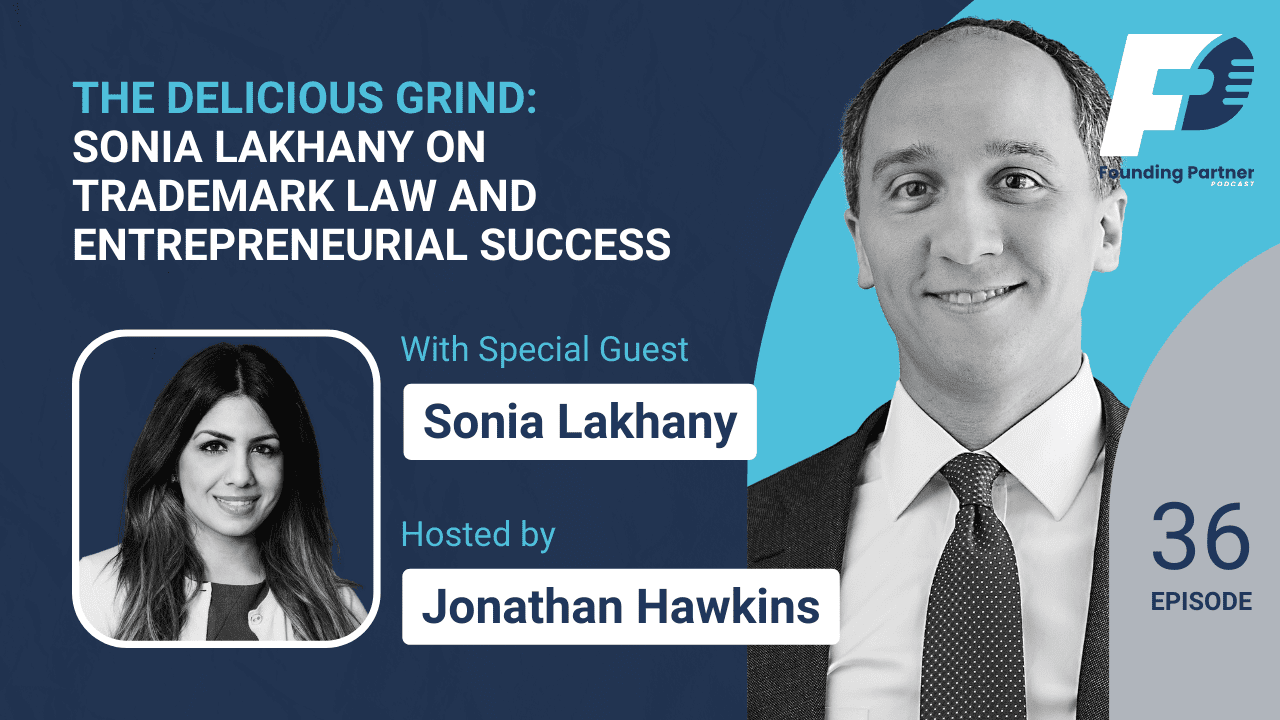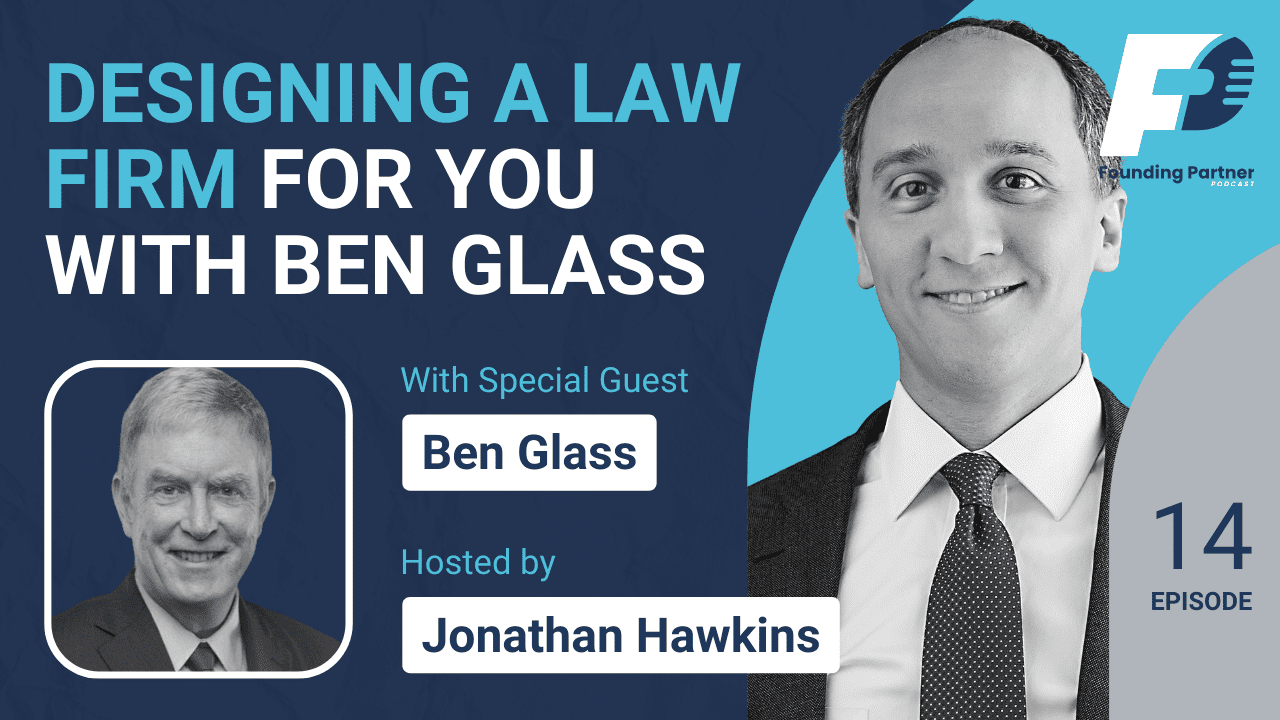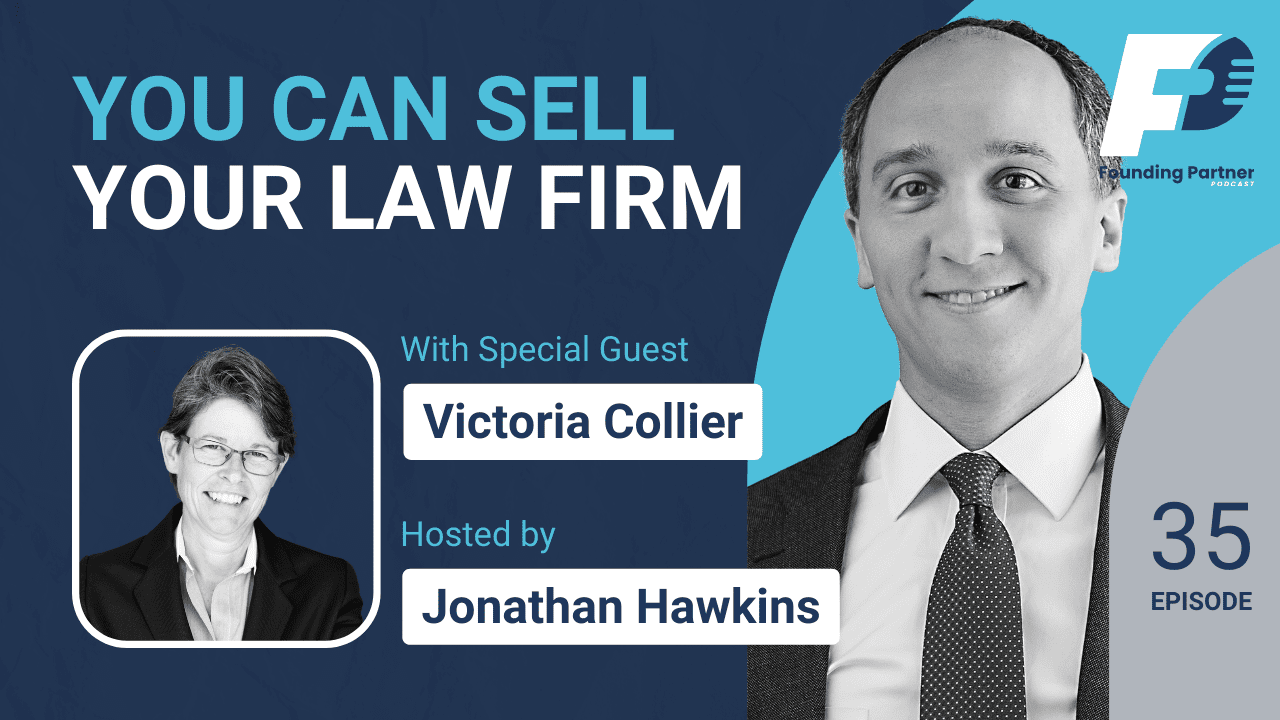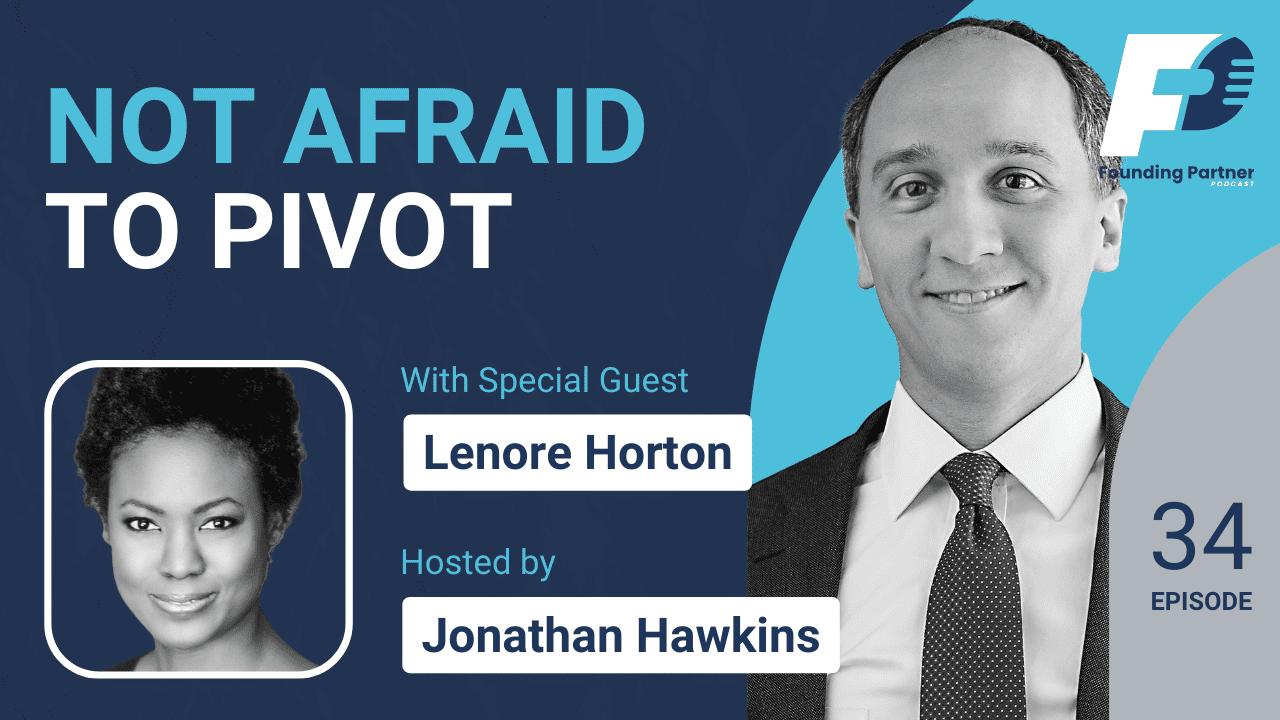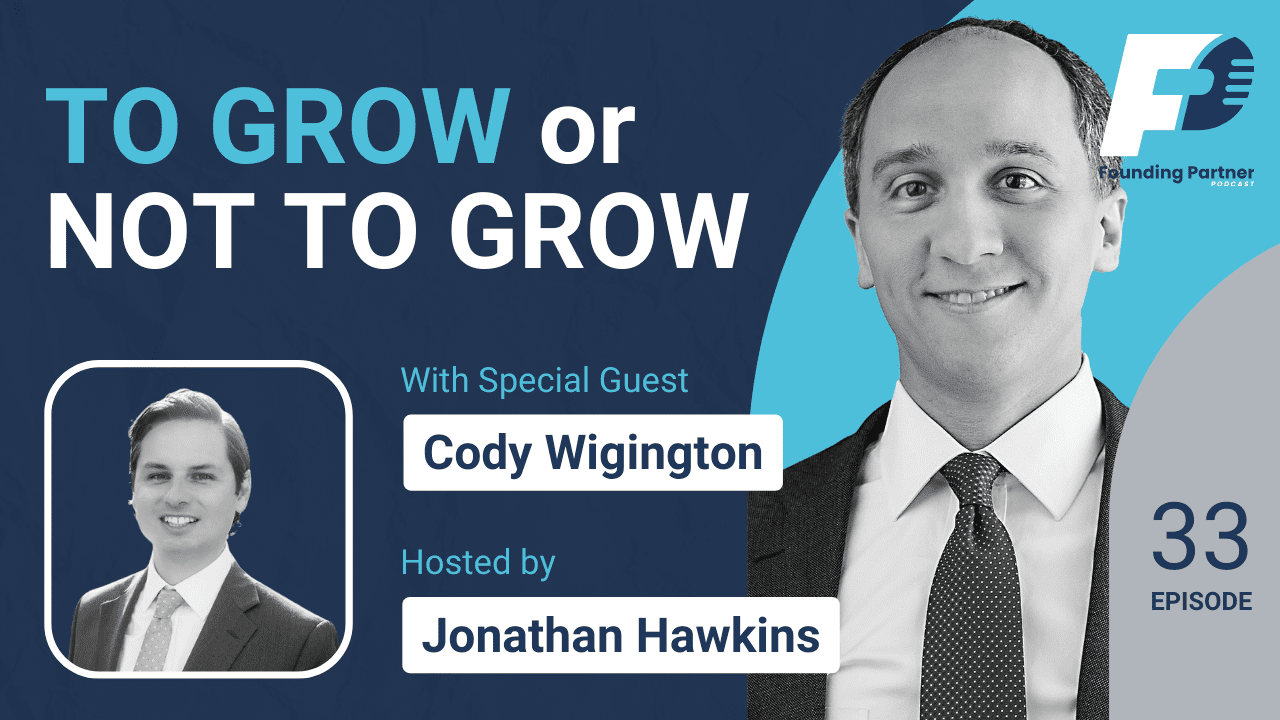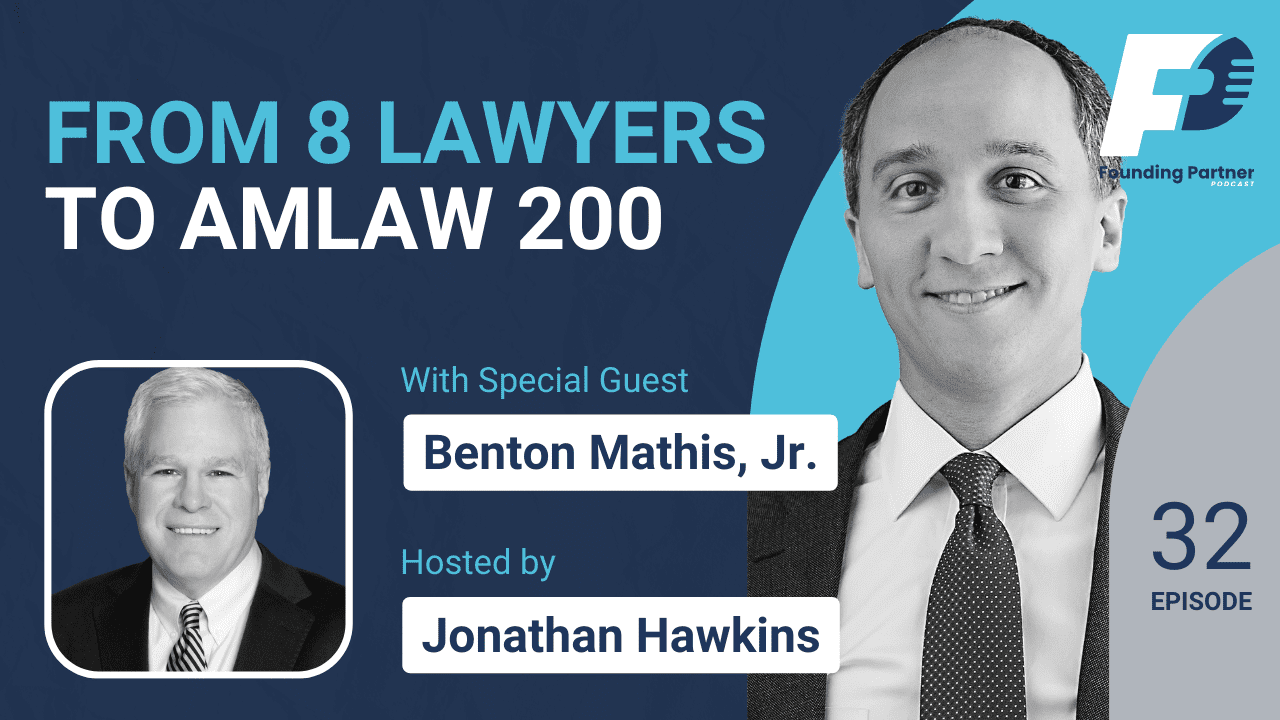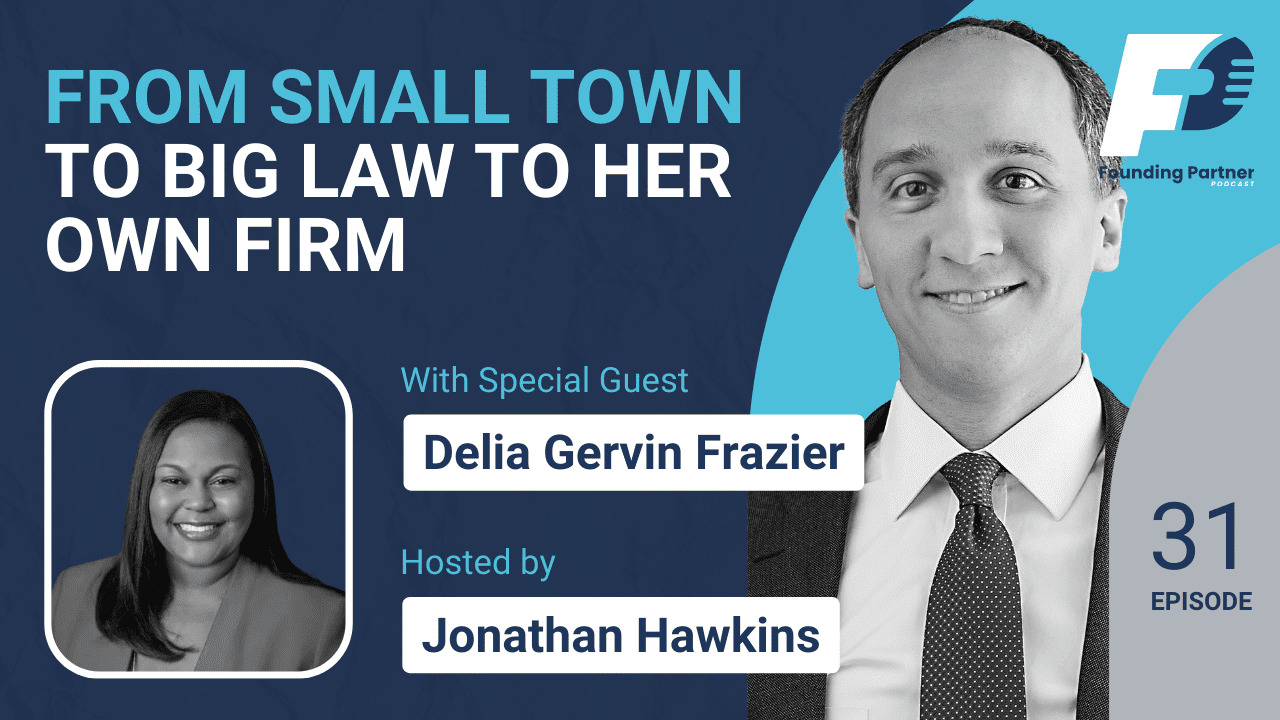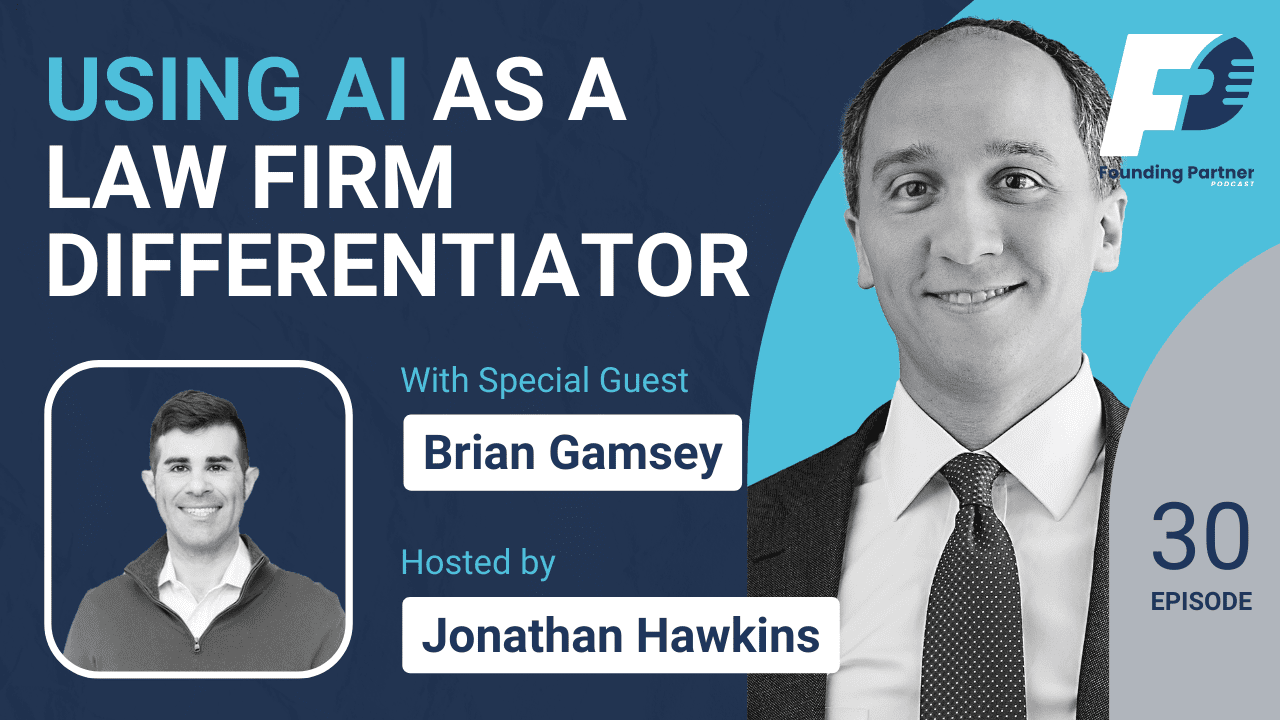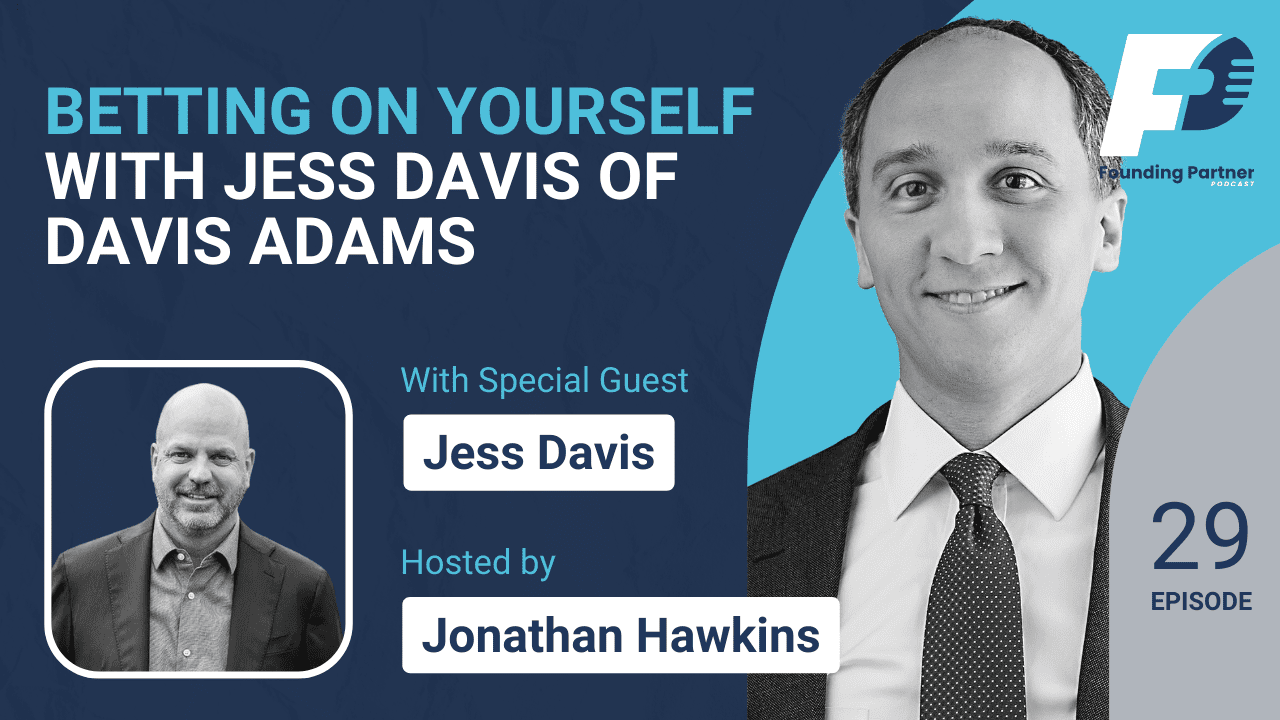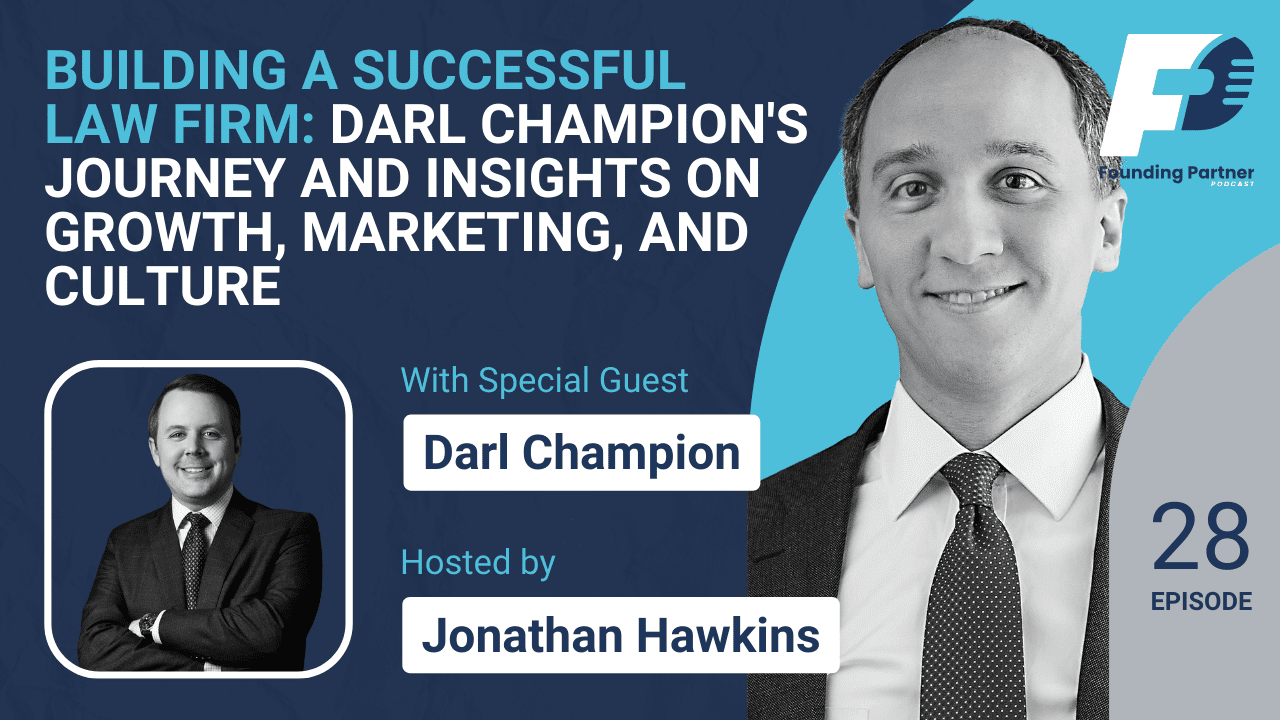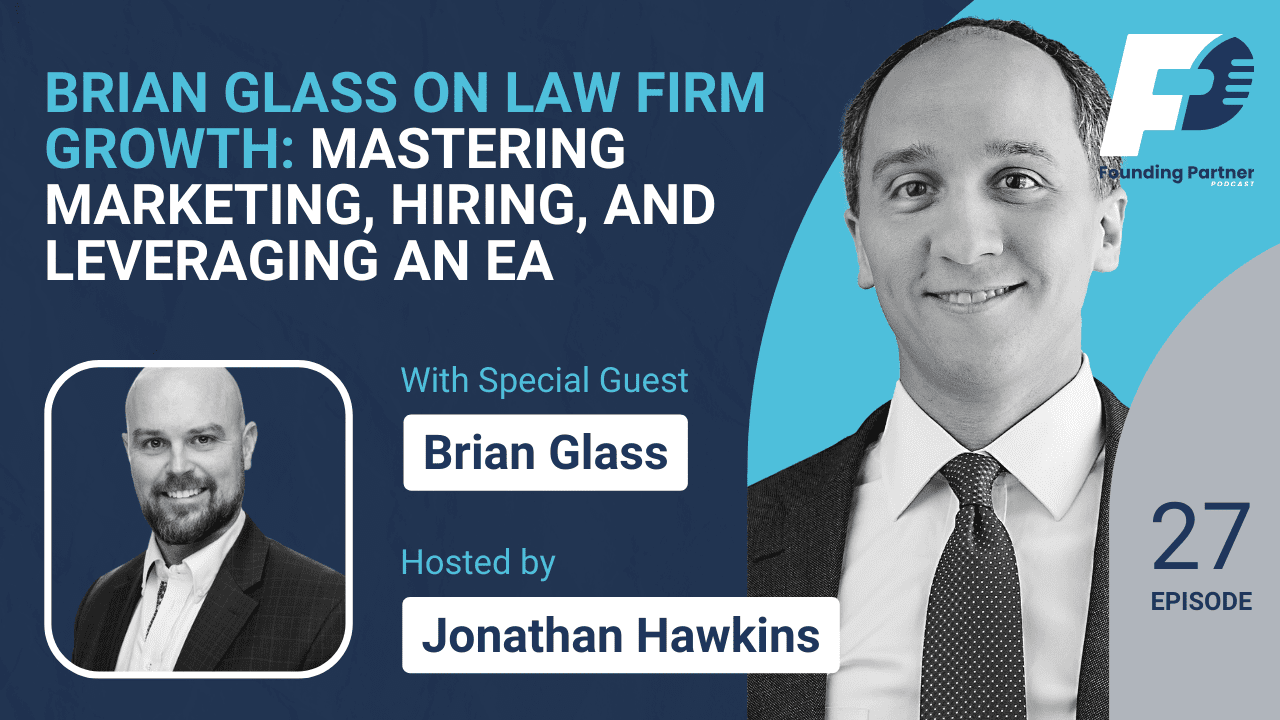[00:00:00]
Jonathan Hawkins: All right Welcome to Founding Partner podcast I’m Jonathan Hawkins Very excited about our guest today We’ve got Ben Glass So Ben I don’t know if you know this you know we met formally maybe this summer this past summer but I found you years ago When I was a young associate and just really interested in in marketing and legal marketing and I was just doing internet searches and I did come across you way back when so I I’ve known about you for a long time but why don’t you introduce yourself Tell us about your law firm and about GLM as well
Atty. Ben Glass: Sure. So, but what you experience is is a great lesson for the lawyers who may be listening to this, is that, you know, you may have prospects that come and pay attention to you for a little bit or see you. And then hang around a long time before they take action. So, so never, never give up. I don’t know what it caused you to to come back again in the last year or so or to take action, but that’s an [00:01:00] important part for everyone to remember.
Yeah. So, so thanks Jonathan. My name’s Ben Glass. I am I just celebrated 40 years of practicing law. So we run a small law firm here in Fairfax, Virginia, right outside of Washington, DC. My son runs personal injury cases in Virginia. I run this weird niche that I discovered maybe 20 years ago called Arisa, long-term disability cases, mainly in Virginia, mainly in the Fourth Circuit, but we’ve got some cases spread out across the country.
We’ve got about 18 people or so under roof. We just counted up the other day. We’ve got three and soon to have four virtual assistants based out of the Philippines. And so that’s been an interesting, you know, a interesting add to our leverage here. We’ve got a good brand here in Northern Virginia.
We operate in almost a competitive free zone in the disability side, of course PI is very competitive, but we’ve got a good brand space here. And you know, like most lawyers, John, I had a pretty typical path. Went to law school got a job out of law school. Actually got a job in [00:02:00] law school with a guy who then hired me and stayed with that for minutes.
Different generations for about different iterations for about 12 years. And he he was a very good personal injury attorney in Virginia. And so I was really lucky Jonathan because, uh, the firm was doing a lot of insurance defense work, but trying to transition to plaintiff’s work.
And so they let me do a lot of insurance defense work, which meant in my early years Jonathan, I was trying cases. I was tending hundreds of depositions, oftentimes with teams of lawyers. So I got to learn from very experienced lawyers, got to travel around the country a bit. And they pretty much let me have a ton of experience that I think in 2024 it’d be, it’s hard to get the experience that I got, like almost right outta the gate, trying in some cases pretty significant medical malpractice defense cases in, in Virginia and in Washington, D.C.
And got that entrepreneurial itch, Hey, let’s go start something on our [00:03:00] own. The reality is I’ve got a large family. I was coaching three kids, soccer teams in the same season, and that was becoming a headache to get their practices because the office was so far away. So I opened an office near where I lived.
Didn’t really know anything about what I was doing. I was a good lawyer, Jonathan, getting good results. Didn’t know anything about business, didn’t know anything about marketing, and, you know. Nine months or 12 months after the cases I brought with me ran out. I was in trouble. And so that started my journey Jonathan into trying to learn, particularly the marketing, how do you drive leads?
How do you become relevant in a space where back in those days it was Yellow pages and TV and not many other media. The internet was in, its in its infancy as far as lawyers. Jonathan using websites. I did have one of the first websites and I took a class at Arrows. If people remember Arrows, I took a class in HTML design.
At one point I was a solo practitioner. I had time on my hands and I needed [00:04:00] website. So that’s how old I am. We start, we were using carbon paper and typewriters when I started practicing. And so, but Dave, we’ve got a good robust firm. We’re surrounded by my, in practice with my son Brian. We’re surrounded by a great team.
As you know from being a part of our mastermind group, we work very hard on creating a place that people would really like to come work for. And then once they come work there, they really wanna stay. Now we’re not perfect at it. Nobody is, but I think we’ve, that’s what we’ve worked on, mainly building a place Jonathan, where people will thrive.
First let’s just build that entity. We happen to be very good lawyers in the PI and the disability space. But we wouldn’t be as good as we are if we didn’t have a great team. So,
Jonathan Hawkins: So we’re gonna dive into all of that and all
Atty. Ben Glass: yeah.
Jonathan Hawkins: I I I want to go way back though Back when you started your firm and I I know you’ve got a lot of books out We’ll talk about that too I’ve read most of them I don’t know if I’ve read all of them but you know go back to starting your firm you know[00:05:00] it’s fairly easy to start a firm You need a law license internet connection know that’s about it We need clients too but but back then you know starting a firm wasn’t you know there are a lot more resources now to help folks back then I don’t know if it was really straightforward you know take us back
Atty. Ben Glass: Yeah,
Jonathan Hawkins: and how did you do it Or you know how did you know you could do it
Atty. Ben Glass: it’s a big question, so you’re right. I was always curious about the entrepreneurial side of the business. There weren’t a lot of resources, so there weren’t people teaching lawyers specifically how to market. There were a number of books, you know, mainly published by the ABA or its affiliates about starting your law firm.
They were very basic and they dealt more with things which are important, like setting up your trust account, you know, getting your lease. I mean, those things are all important, but they don’t feed you what feeds you are cases coming in the door. And so, [00:06:00] you know, I decided to leave my firm basically on a Friday.
Came in over the weekend, got cases we split amicably, and on Monday or on the weekend, I met Office Depot, Jonathan, wondering what have I just done? Because I didn’t even have space. I had not. This was not a long-term. Plan by any means. And we just did it. And my wife fully Sandy, fully supported what we were doing, even though it was very scary.
We had just in the last year bought a, you know, a very nice house in Fairfax County. And I just did it. And so it was, you know, starting a firm was relatively simple. You, I eventually got space and started telling my friends, I. That, hey, I’m doing person back then, personal injury and medical malpractice, plaintiffs work, then that’s all.
It wasn’t in the insurance defense work out in Fairfax and we just started to get cases in. And again, I took work with me, so I had cases to resolve and I had somewhat of [00:07:00] a runway of money. So that wasn’t the issue in the beginning. But the issue was I was not trained on.
How to get cases. And again, all I knew was what I looked around and saw other lawyers doing. And the only way you could compete when you’re thinking like that is I’ll have to buy more. Right? I have to buy a bigger yellow page out. I wasn’t in tv. I didn’t know a lot about getting referrals.
Again, the internet was new. So it was. Michael Gerber’s, entrepreneurial seizure. I can make good cookies, let’s go set up a bakery. And and I fit right into his book on that because I made every mistake and, you know, fortunately survived it. But it was really hard at times. And even when I got good at getting cases in, I didn’t know anything about people and managing and scaling.
And so I, you know, I went from the disaster of not having cases. Then being able to generate cases so we can talk [00:08:00] about some of the early ways, and then trying to scale and not knowing anything about managing people, hiring the right people holding them accountable for, you know, what they promised to do.
And so that was a learning curve. So I’ve, I did everything the hard way I think.
Jonathan Hawkins: Well I wanna dig into all of that but let’s let’s start with some of the marketing I Folks that know you know that you know you’re a big Dan Kennedy disciple I’ll say you you went down that rabbit hole But take us through the evolution of your discovery of different marketing techniques and you know to piggyback on what you said I You know I’d say even today most lawyer marketing is pretty boring If if any back then probably even worse So you know take us through your
Atty. Ben Glass: Yeah,
Jonathan Hawkins: and your discovery of various marketing techniques and and things that weren’t in the law and then you’ve applied to the law
Atty. Ben Glass: absolutely. Yeah. So, so I was at that time in my early years, I was a [00:09:00] fan of the success literature and the personal performance literature. So I was a Nightingale Conan, you know, I bought stuff from them. And so every once in a while they’d send a sales letter. One day I got a sales letter for Kennedy’s.
For Dan Kennedy’s
Magnetic Marketing Toolkit, and that really opened my eyes to, oh, look at this. First thing you do, first rule of marketing is look around at what everyone else is doing and don’t do any of that. Right. Again, unless you’re gonna beat them on the spend you’re just going to, you’re gonna get killed, right?
So, looked around I swear, Jonathan, I went to the library. And I just looked at all the yellow page books. There was a regional library near me that had probably 30 volumes of yellow page books, thick books. And as you may remember, back in the day, although you were younger they would be 40 and 50 pages of in the a section under attorneys, another 40 and 50 pages in the L section for lawyers.
And so I started writing down marketing messages and I started to [00:10:00] craft like, how could I show up differently? Again, look around what everyone else is doing and don’t do that. And so, the idea that I landed on was, Hey, let’s have something for people that we could make an offer on to at least get them to give us name and phone number back in the day and then later name and email address.
And so that’s where the books came in, the practice, specific books you know, five Deadly Sins that can Ruin your Car Accident case in Virginia. I was the fir, I was the one that introduced that whole thing to the market. Now you see that all over the country. You know, I wrote a book on the Truth About Lawyer Ads, where I, it was really a consumer guide to helping someone who’s been thrust into our world, helping them find the right lawyer and teach ’em how to read lawyer ads you know, whether they were on TV and then, you know, later on YouTube and internet and stuff like that.
And the whole object of that was Jonathan was that if somebody, well, first I could make a broader offer, so then I started running YellowPage ads that said, Hey, before you, if you’ve been injured. Before you talk to a [00:11:00] lawyer, before you talk to the adjuster, hire a lawyer, assign any forms, just get our book, get our free information.
And so people would call and just get our book, lead generation. I would get their name, their mailing address back in the day and their contact info, we’d send them the book. And so then we would, I developed very simple followup sequences to them because what we discovered was people who were looking at their problem and trying to figure out how to hire a lawyer.
Well, they weren’t just hiring the first lawyer that they talked to. Right. They were thinking about these problems. And so then I started to develop, okay, started to look at what we call the customer journey. Like people will enter our world no matter what your practice area is. People will enter our world at different stages.
They may just be trying to figure out, is my problem a problem that legal can solve? Oh, okay. Maybe it is it a problem that I need a lawyer to solve? So, how do I find the right lawyer? Oh, I might wanna fire my current lawyer. And so there’s this whole path [00:12:00] of places where people might be entering the space where they’re looking for you.
And so then I started to create lead generation magnets, again, books, white papers on each one of those stages. So I had everything from the five deadly sins to how to fire your lawyer you know, how and how to read lawyer. I said all these different,
pieces of marketing, which allowed people to start a conversation with me and me to start a conversation with them without it being all about coming in free consult, just like what everybody else was doing.
And so that’s, that worked for me and it was very simple. Back in the day, like today, we have a lot of published books, and of course some much stuff gets delivered by PDF or email, but my stuff was very simple. I literally ran white papers off the copier and I put ’em in nice binding and called it a book.
But it worked. It worked. And slowly you know, I started to get the cases in and then at some point. Dan Kennedy and his then [00:13:00] partner, bill Glazer said to me, he says, you know, your stuff’s pretty good. You should be showing other lawyers how to market and how to build a practice. Because even then there were very few of us of what, let’s just say a guru, teaching lawyers how to build a better practice, you know?
Less than a handful. And so we just I did, I said, well, I don’t know if my stuff is good enough. They said, your stuff is good enough. And so I just started great legal marketing in about 2005. Taking is in essence what we were using in the law firm and now bringing it to the market.
And the greatest thing about that idea was not, that made a ton of money selling stuff right to lawyers. But that I started to gather a tribe of lawyers who were very interested in the entrepreneurial side of practice of law, who were interested in marketing building companies. And so just so now we had a group of people who exchanged ideas, who have an [00:14:00] abundance mindset.
And who would sit down? Our mastermind group started right back at the beginning of rate legal marketing. So sit down with lawyers in a room and say, what are you using in Ohio to get estate planning? Clients great. What can I learn from that to help get porcelain clients in Virginia? And so that was very fortuitous that I started great legal marketing again, not because we were making a ton of money selling stuff back in the day to lawyers, but because we started to, to.
To tease out those lawyers in the country who were interested in building a better practice, making more money, and as the subtitle of my first book was and still Get Home in Time for dinner.
Jonathan Hawkins: So let’s let’s talk a little bit more about great legal marketing You know what is it now Who’s it for And maybe has it changed over the years since when you started it I guess what 20 years ago or so
Atty. Ben Glass: Yeah, well we just we’re starting our 20th year of coaching lawyers there. Yeah. So, so what is it, [00:15:00] first of all, today is literally what I just described. It’s a tribe of lawyers who are interested in learning to build. A better life for themselves, learning to create happiness for themselves and their family without increasing the chaos that oftentimes comes with growth.
And so we have different levels of membership, as you know, we’ve got master two different levels of mastermind groups. We’ve got another coaching group and we do events. So we’ll do a big event every year in October. This year in 2024, we’ll be out in Arizona. We have a monthly journal and mainly Jonathan.
What we are doing is we are showing. Lawyers that there’s a path to happiness in the profession. Like you have a right to live your life as you want it. And by that you get to design a practice that you want, and that’s great for you. And then by, once you figure out like what kind of practice would really make you the happiest.
And let’s go figure out the marketing that drives that avatar or that ideal client to [00:16:00] you. So we’ve served literally thousands of lawyers over the last 20 years from as far away as actually many different countries around the world. We’ve had members from Great Britain, as you know, Canada, south America.
I think we’ve had a member in Russia in the past. Because lawyers are trained. To be good lawyers and you know, that’s the expectation. You’ll be a good lawyer. But nowhere in law school do they teach you how to have, first of all, nowhere in law school do they tell you that it’s okay to also be happy and to not work too hard and to make good money and to work with people you like working for where work with people you like working with.
Work for people you’ll like working for. And so that’s what we bring to the market today and today in 2024, we have lots of other friends in the space too. And I would say they’re all good people. I mean, I have been on their stages. I have talked to them. We are often, some of us are in mastermind groups together.
So everyone you see out there in this [00:17:00] space now, not everyone, but most people you see out in this space, coaching lawyers. Like, we have some sort of a relationship with, we, many of us have grown up together in the Dan Kennedy world. We are, you know, born of that tree a little bit. But everybody’s bringing something different to the market and bringing something to different markets.
So I’m, you know, I’m, we’re very popular, obviously, in the PI space and in the space of lawyers who are doing, you know, maybe. Anywhere from as low as $350,000. Top line revenue to a million dollars is kind of our one group, and then above seven figures to three, to four to $5 million. That’s our space.
There are folks out there in the coaching space now that are working only with lawyers above everything that we do. Perfect. There’s some folks that are working with lawyers even, you know, smaller, I guess, and newer to the practice than we are, and that’s great too.
Jonathan Hawkins: So there’s a lot to unpack there so I want
Atty. Ben Glass: Yeah, I.
Jonathan Hawkins: to go through some of that but let’s talk about law [00:18:00] firm growth I know you have all types of members in GLM I know you’ve worked with all types of of lawyers and Growth to one might mean something different than to another You know some want to get as big as possible and others just want to maybe work as little as possible and just design it as you said sort of design the firm they want and I’m sure you’ve helped people that wanna go one way and folks wanna go the other way
Atty. Ben Glass: Yeah. So the, my mantra is this is you have one life to live. It’s a one-way journey. You don’t get any, do-overs, right. And you have a right to be happy and to live for your own happiness. And so you’re exactly right, Jonathan. For some people, growth means I wanna have multi-offices, multi-location offices.
I wanna have 50 or a hundred people under roof working. And of course in America there’s firms with [00:19:00] lots more people under roof. And we say great. Because what we work on first Jonathan with new members is what would be what? What does perfect look like for you? And oftentimes, what does perfect look like for you and your spouse and your family?
- Because if the lawyer is happy and wants multi-city location growth, but the spouse is like, no, this is driving me crazy, then we at least, you know, make the couple think about this. Like, like really let’s make sure that we are aligned as a family first. That’s a big thing. As you know, Jonathan, I’ve got nine kids, been married forty-two years.
So it’s been important that our growth at Ben, Glass Lawn, our growth at great legal marketing is aligned. With what we want to do as a family. So, and then this is what I’m really good at, I think, and what great legal marketing is really good at is if you Jonathan have a clear vision of what perfect would look like for you.
And we encourage you to not think about you know, that I don’t have [00:20:00] the money to get to perfect. I don’t know the right people, I don’t know the right resources. Like we put those things aside for a moment to vision what would be perfect. And then what we’re really good at is helping lawyers. Figure out Jonathan how to use their next hour and their next dollar.
And I say that because there’s a, as you know, like there’s so many resources out there today, so many coaches, so many technologies you know, there’s a new SEO expert more in every moment, right? And they’re all pretty good when used in the right order. So what we are good at is helping you because of our experience running our own firm.
’cause we are running a firm, we are full-time practicing lawyers here. And because of our experience of working with so many lawyers over time is we help you prevent making the mistake of leaping ahead five steps and investing in something that you’re not actually ready to invest in. We don’t sell SEO, we don’t sell website, we don’t sell paper, [00:21:00] but we don’t sell any of those services.
But we are an excellent resource for helping you decide who to work with. As you know, many of the conversations in our mass of my group are about vendors, and not only about vendors, but about like who inside a particular company. You really need their cell phone number ’cause they can really help you.
And then and then what we work on is preventing you from going to overspend on something that you’re just not ready for example. If you don’t have someone who’s dedicated to answering the phone and has got scripts and who fully understands the culture of the firm and who you’re looking for, then why are we running some big TV campaign or Facebook campaign or some to drive more leads down a really bad customer experience?
’cause you don’t have a pro on the other end of the phone. And so we would work on helping you develop those processes so that the new leads that come through your office are getting a terrific. Customer or client [00:22:00] experience because at the end of the day, Jonathan, that’s what people are gonna remember most.
Like we lawyers think we’re so special, but we’re not really special. There’s a lot of good lawyers. There’s a lot of lawyers that can do the lawyer part better than I can. Undoubtedly. There’s lawyers that can do what you do better than you can, right? But what we can excel is in the customer and the client experience and that’s our real competitive advantage.
And if you get that right and then you go out and get more leads, then that’s gonna be golden. If you drive more leads down, a crappy experience, you’re just gonna get bad reviews, bar complaints, malpractice complaints, and your weekends are gonna be miserable ’cause you’re gonna try to unwind all of this you know, bad stuff that a bad experience.
Jonathan Hawkins: Yeah I I’m with You You know new law firm owners as You grow you as you know you have limited resources You can’t spend it everywhere all at once And back to your point there really is sort of a a path folks should take You know I’ve had folks call me and say obviously they’ve talked to some [00:23:00] billboard salesperson and they’re convinced that Hey I wanna spend all this money on the billboards And I said all right you have you know twenty-four to thirty-six months worth To spend on billboards ’cause this that’s how long it’s gonna take maybe for it to work So you’re better off doing something else first but lemme shift real quick So back to something you said earlier you know designing the life you want This is something I know I’ve heard you speak about a lot particularly You know all the bar associations You know as a as a profession we know there are a lot of unhappy lawyers and a lot of depressed lawyers a lot of lawyers that have substance abuse problems etc the state bars about wanting to fix that And you know maybe band-aid solutions if that I don’t know but I I know this is real important to you and and I wanna give you a minute to talk about what you think is the right approach versus some of the band-aid approaches perhaps we see from other areas
Atty. Ben Glass: Yeah, look, so, so there’s no doubt that the profession can [00:24:00] be stressful. My complaint with the lawyer wellness programs is not that the advice they give is wrong, like. Eat better, get more exercise, learn meditation, whatever, right? None of that is wrong, but what they never talk about is, Hey, let’s go over here and focus on working on our business.
So much of lawyer unhappiness is driven by, you know, clients who are not happy people and who become a terror, both for the lawyer and the lawyer’s staff. Well, let’s build something so we never have to take one of those clients again. And so much of the profession, what you learn growing up in the profession is like, you gotta go help people.
Like, oh, we’re these superhuman beings that need to go help everyone? And I’m like, no, actually we don’t need to help everyone. Right? We actually do better for society. When we build a firm, and whether it’s a solo practice like I started, right, or something [00:25:00] robust you know, Mike Morris’s firm in Michigan and I had a Kate and I canceled on my podcast recently.
You know, we are doing, we will do better for our communities. When we are running same organized, happy businesses. And so my condemnation of the Bar Association Writings, is that they never talk they never want to talk about profit margins, KPIs marketing, culture, hiring, firing, stuff that, you know, we talk about that all the time at great legal marketing.
So that’s my bitch with ’em. And it’s interesting because as I write letters to the editor, you know, I hear things like from the people that are editing the letters before they go in the journal. I hear things like, I think you’re right. But I’m inside an echo chamber here. And so we really have to be careful about what we say.
’cause we are the, you know, ABC state bar. So there are people out there who un who know that what we’re doing is right.
You know, and the last thing I’ll say on this [00:26:00] is that law firms or law schools are meant to create widgets for big law, right? And so that can be miserable. I’ve represented a bunch of like five and six year big law associates who get some sort of disability and can’t work.
And the life they described as horror, I mean, it’s absolutely horror. It’s in an ICL condition building, but it’s a horrific life.
Jonathan Hawkins: you’ve talked to those kind of folks too and it’s they they they don’t realize there’s another way
Atty. Ben Glass: That’s it.
Jonathan Hawkins: they believe
Atty. Ben Glass: Oh yeah.
Jonathan Hawkins: is the only way
Atty. Ben Glass: Yeah. And that’s a shame. It is a shame that they don’t see what you have seen, and many lawyers have seen when they come to elected a great legal marketing event, or they sit in a Richard James or our John Robbins event, like there’s a whole bunch of us who are really happy running small firms.
But the backbone of the small firm is, it’s run on business fundamentals. And again, you, ’cause you asked earlier about like what did you learn outside of law? Well, most of the business fundamental stuff we’ve learned comes from outside of law. It comes from [00:27:00] guys running a car repair shop. Like who’s running a profitable car repair shop, probably has good systems, probably is hiring appropriately, probably is running his money appropriately.
Gee, is there anything he is doing that we could import into law? And the answer is yes.
Jonathan Hawkins: Okay So stepping back again you’ve got you still have your law firm that you run and you’ve got GLM How do you balance the two How have you figured
Atty. Ben Glass: Yeah,
Jonathan Hawkins: over the years
Atty. Ben Glass: I say no to almost everything. So I’m, I’ve what the skill set that I have developed over the years, 40 years of practice running a big family, a referee, high school and youth soccer games is not being afraid to say no. Because here’s what happens, Jonathan is that really successful people in a community, in an organization.
You know, they get asked to do a lot if you’re in a house of worship in a, you know, I’m in a church, same church for over 30 years. But you get asked and there’s this kind of [00:28:00] Guilt thing, like when someone’s asking you to join a committee or asking you to volunteer for this or that. When I was young I had a hard time saying no to people who were older than me, asking me to be on committees.
I was honored to be on a committee. Then I would say yes, and then I would be miserable ’cause I’d be spending Friday night on some committee meeting. So I say no to a lot of things. The other thing I think I’m pretty good at is now is creating systems that allow me to delegate. Things that I shouldn’t be doing.
And it’s a problem. Lawyers have, ’cause lawyers think, well, I’m the only one that could do depositions. I’m the only one that could answer discovery. I’m the only one that can write a brief, and this is simply not true. Right. Of course, you have to be licensed to do some of that stuff. But brief writing, like I’ve had great non-lawyer brief writers who I can teach how to take a subject matter.
How to craft something that gets us maybe 80% of the way there back in the day. And now it’s really close to 95% of the way there that I now come on and edit and create the icing [00:29:00] for many lawyers in America now are using outsourced you know, VA’s in the Philippines and other places around the country, and they do quality work.
Now you have to monitor it. You have to have systems for teaching people how to do things right, but you don’t have to do everything. And you know, it is a thing that drives lawyers crazy. It keeps ’em at the office for way too many hours. Is that when they refuse to delegate so much of the running, particularly the running of the business of law.
So two things, one to delegate, two, just to say no to a lot of things. And I guess the underlying philosophy on that Jonathan is I was born with a certain set of gifts, talents, and interests. And I believe my job is to explode those specific gifts, talents, and interests. You probably have heard me say before, like, I get the hives.
If I go through home Depot. I’m not a build-IT guy. I’m not a hammer and nail guy at all. Like I. I’d rather overpaid to get that work done. ’cause it’ll get done right and it won’t get done right if I do it. So I focus on things I’m really good at. I’m good at [00:30:00] marketing. I’m good at coaching the team.
I’m good at developing our culture. I’m good at strategizing in the cases that we do. Like we just came out of a meeting a few minutes ago where there’s six people in the meeting. We’re just going down on cases and I’m going do this. Here’s a strategy. Think about this. I’m teaching them some of the younger ones, things they don’t know.
That’s my space.
Jonathan Hawkins: I think that’s important When you know when I started I went to law school I wanted to be a trial lawyer At least I thought I did And when
Atty. Ben Glass: Yeah.
Jonathan Hawkins: I started at a med mal firm I got a lot of experience and every new thing I did I thought was awesome You know my first trial my first deposition all of that
Atty. Ben Glass: Yeah.
Jonathan Hawkins: But it got old and then us I figured out I didn’t like it You know there are those lawyers that are born to try cases I know some here in Atlanta that are in their seventies and they don’t ever wanna stop trying cases
Atty. Ben Glass: Yeah,
Jonathan Hawkins: doing that but I
Atty. Ben Glass: well.
Jonathan Hawkins: That’s the key
Atty. Ben Glass: That’s Well, and if that’s their definition of perfect, then great. Then they need to surround themselves to people who can go and get cases, who can get experts, who can [00:31:00] do all the paperwork and they wanna be in trial. And that’s perfect because we don’t make a judgment of whether somebody should be doing the legal stuff or trying cases or any of that.
That’s not our judgment to make. What we help lawyers do is if you’ve made the judgment of which, where your time is, where your energy is best spent. We’ll help you get there.
Jonathan Hawkins: Okay so I wanna shift again your son Brian is is a lawyer and you guys work together I think you’re officially partners as well
Atty. Ben Glass: Yes. Yeah, we’re 50, 50. 50 others.
Jonathan Hawkins: Tell me about that how that came about
Atty. Ben Glass: Okay, so, so Brian graduated law school and went to work for another firm for a short while, and then went to work with another PI firm. His thinking, our thinking was, well, he graduated in 2008, so he graduated right into the recession. And he wanted to see the world and make his space. He’s always said, look, I don’t wanna do a job where if I do, where I get paid the same as everybody else, I wanna be able to [00:32:00] control my own income.
So, planet’s contingent fee work where he could get paid more. The more that he developed his referral sources and closed cases, the more money he made. That’s, that was his space. About six years ago, we were Ben was moving the two organizations, Ben Glass Along great legal marketing into bigger space.
It was a great time. I said, well, look, if you’ve ever thought about, like, I don’t wanna press you to do anything, but if you’ve ever thought about coming to join us and, you know, bringing your type of cases to us and bringing your analytical skills here, like this would be a good time to talk about that.
And so we did. And it would not have been the good time, the right time, any earlier than that. We were both had. Things that we needed to learn. And then we did a deal and we basically did it on, you know, the back of a napkin. We each had separate lawyers just to make more so, to make sure that we weren’t missing something that we needed to talk about and have agreement about.
Right? And then the whole deal was blessed by my wife, his [00:33:00] mom. And so that’s how the deal started. Today, you know, we, we run EOS, the Entrepreneur operating system, you know, from the book Traction. We run that religiously in the business in both businesses. And I’m the visionary and he’s the integrator and he’s a fantastic integrator.
He’s got skill sets with numbers and spreadsheets and analytics and KPIs that, that just isn’t my jam. And when, so when you take my visionary. Talents and his integrator talents. We really have built a rocket ship. It’s the name of another book, Rocket Ship. But where our whole reason for being a Jonathan is we wanna build a place where people will thrive.
So, not necessarily the best PI firm, not necessarily get justice for Crocs and victims. That’s what everybody talks about. We thought that we could build a place where the owners thrive and the team members thrive. Then if you get those two things right, then the clients will thrive. And so far we’ve been right on that.
It’s not to say that it’s easy, [00:34:00] it’s not to say we don’t have disagreements, but you know, when we’re in the room and we’re debating stuff, okay, we can have disagreements. We have a leadership team, we walk outta the room, we’re all aligned behind, behind the agreement that we agreed to. And we have business coaches who come in and coach us on that.
We each have our personal mindset coach. You know, that help us with sort of life coaches. We have that. So we invest pretty heavily Jonathan in our own corporate and individual coaching, which has helped. I.
Jonathan Hawkins: So you know from my perspective you two seem to really well together Is that is that natural Or have you had to learn how to do that Or or hopefully you haven’t had to have your wife his mom step in as a referee
Atty. Ben Glass: No, I think it’s been pretty natural. I mean, he is he is naturally inquisitive. I’ll tell you a big thing that helped him was he as I have grown up in other mastermind groups, right through the Kennedy years, and you know, I’m in other groups of people who do things bigger, [00:35:00] better, and faster than I do.
And then he found a group GoBundance, which has been that for him. And so he hangs with, it’s a men’s group. They have a women’s side, but his in the men’s group of guys who are oftentimes. Multiples and multiples of net wealth. Larger than you know, anybody we know collectively. And they really focus on not just the business, but even more so the life, like being a good dad, being a good spouse, being a charitable giver.
And so that’s to, for me, to watch him in that journey and go off with those guys. That’s been really cool as a father. And so we’re both. We practice open and honest communication. We do not agree about everything. But when we have disagreement, we are good at, again, the skill that we have developed is, Brian, this is why I think that ABC is right.
We should do this. And he goes, well, dad, [00:36:00] this is why I think ABC is right. And so in our visionary and integrator role, he actually, the integrator is the tiebreaker. On that stuff. So that’s an EOS mantra as well. So, we’re fortunate, I mean, we’re Brian’s wife, Krista is here as hr and so she’s really helped develop hiring and processes and internal you know, just employee things that we didn’t have documented before.
Now we’re like all grown up.
Jonathan Hawkins: So you mentioned earlier it sounds like you and Brian agree you want to build a firm and have a place where people can thrive So let’s let’s talk about that a little bit You know we’ll I’ll call it the firm culture discussion
Atty. Ben Glass: Yeah.
Jonathan Hawkins: you know what is your approach on the team around you and a place for them to thrive
Atty. Ben Glass: When you come here to work, our promise is this will be the best place you ever worked. Alright. And we say that with with power, [00:37:00] because we say Jonathan, if you work here, one of the things we live and die by is I want to know how I could make this the best place you’ll ever work, Jonathan. I can’t promise that I could fulfill everything on your list of what perfect would be, but I can tell you this, that if you’re not thinking about that.
We’re not thinking about that and we’re not communicating about that, then what are we shooting for? Because I genuinely want to bring people into the firm, Jonathan, who we could build to be so good. They could go out and compete with us, but they don’t want to leave. Now we do have people leave and we do have people leave and go and compete with us, and that’s part of entrepreneurship.
But I’d rather do that and I’d rather have that person working for me. Then someone who comes here and five years later, they’re the same person. So we are big on we have basically unlimited spending on, if you’ve got an event [00:38:00] you want to go to, that’ll make you a better lawyer, paralegal, director, whatever.
Like we are seriously gonna try to get you to that event. Brian and I spend a ton of money every year on events that we go to. And so we start there. We have a director of happiness. And her job is to also be fessing out. Like, what do you like? What snacks do you like? How can we make your life easier?
How can we make this a law firm that’s just so different in from any other law firm in Northern Virginia? We’ve got people who work here, Jonathan who’ve grown up in, let’s just say insurance defense firms. And I’m shocked. I’m shocked at the how little money is spent on these people and how little is spent on development, on how little technology they’re given, on how little training they actually have.
On how little mentoring they actually have. So the bar is not high, I don’t think, to create a place where I want people to, like coming in on Monday morning. And we’re pretty successful at that.
Jonathan Hawkins: I wonder when you have this conversation with an interviewer [00:39:00] interviewee or a team member I what what’s the reaction that
Atty. Ben Glass: Yeah.
Jonathan Hawkins: I imagine they’ve they have never heard that from an employer before
Atty. Ben Glass: Yeah, so you don’t get much. It, this is one of the things you have to work on because no one is gonna tell you, but what they’re thinking is, oh, I’ve heard this before. Right? That’s what they said at my last company. That was a promise that was made and it hasn’t been fulfilled, or they’ve never heard it before.
So we tell ’em as as you may know, we have a culture document. By the way, if any of your listeners. Our culture document. We’re happy to make that available to them. It’s nothing proprietary, but it talks about the history of the firm. It talks about our core values and it’s and it talks about how we treat each other and that we really mean it.
But Johnson so that new employee who’s interviewing with us they can’t, they don’t have any reason to believe us, right? ’cause they don’t know us. So that’s something that is [00:40:00] in every meeting, in every court. So we have weekly leadership meetings. We have quarterly leadership meetings, but also quarterly team meetings.
The team, the two verticals each meet also once a week. And it’s just something that, that if you work for me, Jonathan, I have to work to convince you and show you. That this is true again, and we’re not perfect at it by any means but we’re conscious of it and we work at it. Like no one could look at us.
No one could honestly leave here and say, we didn’t try to make this the very best place you would ever want and a place you would not wanna leave. And anyone who said that leaving us would be a lying.
Jonathan Hawkins: you mentioned earlier you you imp you use EOS system I know a lot of other firms do that as well Maybe you could speak to Your firm and how you ran it before EOS compared to how you run it now and and the difference and perhaps the results You’re seeing the difference in results
Atty. Ben Glass: Yeah, sure. So I’ll start with the results is with [00:41:00] any coach that anyone who’s listening to this hires, the promise of the coach should be that. Yeah, my fee sounds stiff right now, but I’m gonna make that fee irrelevant for you. And so, EOS we pay $6,500 a day. There’s an annual two day meeting, and there’s three quarterly meetings that the EOS implementer is in.
So you can do that math and the fee has been made irrelevant for us. So what EOS Entrepreneur operating system does is installs a. Way to run the business that is agnostic about the industry. So any company in around the world that’s running EOS, whether they’re lawyers, they’re making widgets, they’re neurosurgeons they’re running the same meeting agenda.
They are, they have crafted core values and they’re hiring and firing to their core [00:42:00] values. They have written and documented processes followed by all, they have a rhythm of meetings I mentioned weekly, quarterly, and annual retreat. So they’re all running the same meeting. And what that has done for us as we scaled and got more people under the roof, more cases, more money running through the door, is it has helped reduce the chaos.
’cause back in the beginning of the podcast, I said, look. But we’re good at helping lawyers have happier lives without increasing the chaos and what and with reducing the chaos. So, so we don’t teach EOS. We are huge fans of it. We think that it fits perfectly with what we are teaching at great legal marketing, which is essentially how to get more clients, how to get the right type of clients in the door, and then how to hire, fire train how to deal with vendors like the,
the rigidity or the I guess the mechanics of running EOS just fit perfectly, we believe with what we’re [00:43:00] teaching at Great Lugal Marketing. I would say this too, like just in terms of spending on coaches, the more you spend on a thing on a gym or a coach, like the more likely it is you’re actually gonna go do the thing and show up having the thing done.
So there’s that too. It, we say it changed our lives, so that’s a high endorsement, but that’s what we feel. Yeah.
Jonathan Hawkins: So so another thing that I know you’re talking about more lately you’re thinking about a lot and that is the assuming the CEO role at a law firm and I know you’re pretty much there I don’t know if you’re a hundred percent there but you’re pretty much there take us through your journey to get there And I know you talk a lot about sort of the guilt that some lawyers feel when they assume the CEO role
Atty. Ben Glass: Yeah. So first, what are we talking about there? It’s we’re talking about, I think doing the things and mainly only or mainly the things that are really best for the business as a [00:44:00] business, right? For many of us, it means doing less of the legal. And more of the running of the business, the meetings, the marketing the creation of systems.
And you know, as you journey through the profession, like it’s easy to say, oh, be the CEO of your law firm. We recognize that’s hard, right? It’s particularly hard if you’re doing a hundred million dollars in revenue. If you are the only lawyer, or you have one lawyer, one associate. Like your job at that stage is to work really hard.
Learn to be a great lawyer. S stop the leaking out of the bucket of leads and money and bad spends and bad customer experiences. And when you get to, we think around that million dollar or so, mark is the space. Is it really the area where if you are gonna continue to grow in revenues or grow a number of people under the roof, somebody needs to be running the firm as a [00:45:00] firm?
Alright, you could hire in A CEO, but it’s challenging in an environment where we can’t generally cannot have non-lawyer owners and people who wanna run businesses as CEOs really want a piece of the action. They want a piece of the equity. So that’s a challenge. Right. And then oh, the guilt thing, like, so the guilt thing is this, is that I come into the office usually at 11.
Soccer season is starting in a couple of weeks here. So often dams, I’ll be out at three 30 or four. I’m not taking depositions. I’m not answering discovery. I’m not writing briefs. I’m attending meetings and when I leave, there’s still a whole bunch of people here usually, right? And so this, when someone has spent their whole career working very hard.
Being first in last out, oftentimes being last paid as I have and many other lawyers in the solo and small firm market, like they know exactly what I’m talking about. You get to that stage where it looks like [00:46:00] you’re not working as hard, you’re not taking inbound phone calls, but the reality is what you’ve done is you’ve elevated to working on things that are more important for the business today than.
Than they were when you were less than a million dollars of revenue. And again, it’s one of these things that Jonathan, like there’s no bar journal articles on becoming the CEO of your law firm and doing less legal and running the business. They just don’t even have that. Right. And so that’s what I work on.
I teach a number of the other coaches in the space really talk and teach this. But it is both a, it’s a hard work to get there. It’s a psychological journey and I’ve stood up in front of other mastermind groups that I’m members of and said like, I feel really guilty that I’m not working as hard.
And their answer is, BS, you’re doing what you were born to do. Now, like everyone else’s job in the firm is made better because I’m doing more and more pure CEO work. And I am almost there [00:47:00] like I am. I’m involved in very little of the legal.
Jonathan Hawkins: you mentioned soccer seasons coming up I know you’re a a you’ve been a soccer referee for forever
Atty. Ben Glass: 50 years. Yes.
Jonathan Hawkins: it back to designing the life that you want creating the life you want
Atty. Ben Glass: Yeah.
Jonathan Hawkins: Sort of and and Areas to go pursue what you wanna do I assume that’s one of them Talk a little bit about that I know you’ve written a book about soccer refereeing as well
Atty. Ben Glass: Weird, isn’t it? Yeah. So I started at 16. I’ll start my 50th year. I love it. I love being in a stadium high school stadium, national Anthem rivalry. Give me that game. And now in every field is artificial surface, so that’s good. I don’t have to worry about, you know, twisting my ankle on some pothole like I used to have to do.
And I’m just, I’m I would say that I’m good at it. I have a ton of experience every game. Jonathan is both a physical challenge ’cause I’ll run four and a half miles in a boys or girls varsity game and a psychological challenge [00:48:00] because half the people don’t like what I do. Sometimes the coaches are screaming, the fans are screaming, but you really can’t hear them.
The high school athlete is a treasure. The high school boys and girls who are playing athletics, right? And soccer is my space. They’re just great people. I mean, the conversations that we have on the field together that nobody else can ever hear that are great kids. And so I just love that space again I like now mentoring and coaching up the young referee.
So I wrote a book, you a Teenage, soccer Referee, and it really is for that teenager. To get through their first year or second year or third year, when by definition Jonathan, they cannot be good at what they’re doing because you need reps, you need opportunities, you need games to do. And so we’re learning this thing while people are sometimes being knuckleheads and yelling at us.
So that whole book is a mindset book of tools that they can use to survive. Because we lose them in year one and two and three. If we can get ’em to year three, then we can make them into a good referee who may last 50 years.
Jonathan Hawkins: [00:49:00] All right Let’s shift back to to your law firm this is maybe a little bit of EOS and designing your life I think as part of all of that vision essential so you know tell us what do you what’s your vision for your firm and for GLM
Atty. Ben Glass: Yeah. So for the firm, you know, our vision, both of us is to build this place that’s gonna provide us with essentially passive income after we are totally uninterested in doing legal. And we believe that absolutely can be done well, some equity firm come in, private equity firm, come in and wanna buy it one day, maybe, who knows?
But why not let, why not build the thing that you actually could literally walk away from and still get checks from and have this influence that we have on the community, which is a good influence. I mean, we. I grew up here. So we touch a lot of people and we’re proud of that work, great legal marketing.
Same thing. Brian is now more involved in great legal marketing. I’m still the sole owner. And I love it. Like there’s hardly any place I’d [00:50:00] rather be than on stage. Like inspiring not, it’s not just the teaching of the ABC, here’s how you market. That’s not what drives me. ’cause a lot of people can do that.
But Jonathan, it’s the lawyers who come up to me. Oftentimes older lawyers who say, shit, I wish I had seen you 40 years ago, but my love for the law and love for the legal practice has been reinvigorated. Now listening to you because what I, again, what I’m really good at is being that breath of fresh air, I think that says, you don’t have to do this the way they’ve told you.
That being a lawyer has to be for all of these years. There is another way. There’s a whole bunch of us who are enjoying the practice. Again, making more money. That’s important. But the money is like, okay, it’s what does the money get you? The time freedom, the freedom to do things with your family that you wanna do.
That’s really important. And I love mentoring these young lawyers who come outta law school. [00:51:00] Not having seen this alley, this solo and small firm alley. And we go look over here at this, look at these guys. Look at the Jonathan Hawkins of the world, right? And what they’re building. We’ve assembled them all, come into our room because we wanna give you something that the law firms or the law schools won’t give you, and the profession doesn’t give you.
And so I really live on on the excitement of seeing someone else’s eyes light up and go, oh, that makes a lot of sense. Oh, I tried that strategy. Oh, I fired Eeyore who has been working for me for 10 years. Dragging the whole firm down. I really like my life now. That’s what drives me. So vision there is, people ask me all the time, like, I’m six, I’ll be sixty-six end of the month.
Like, when are you gonna retire? I said, I say I, I retire from people I don’t like. And things I don’t wanna do every single day, but why would I retire from doing stuff that actually gives me energy again, my days aren’t perfect. You can come and follow me around for a week. [00:52:00] You’ll see They’re not perfect, but they’re pretty good.
They’re pretty good, and I’m in pretty good shape. And so, you know, I’m generally happy.
Jonathan Hawkins: Well that that message is extremely important and I’m glad you’re out there saying it Keep shouting that message I like your vision as well There’s lots of lawyers out there that that think they’re just gonna have to work forever and they can’t create a a a cash flow type business I think that is false And and I’m glad you guys are pursuing that And and you can show others how to do that real quick we’re almost done here but To the to the young lawyers out there that are maybe thinking about starting a firm or maybe have just started a firm there any top 1 2 3 pieces of advice that you would give them as they are starting down this journey I
Atty. Ben Glass: I would say first know that it is not only possible, but that this is probably the future, right? Your future is not in working in a big firm for somebody else. I would say know that there are ma what I call [00:53:00] many good rooms right now. So I run a great room. There are many so my friends, Ken Hardison, Richard James r John Robbins, Mike Mogul, running good rooms.
I, I would want to get to one of those conferences, one of these grow your practice conferences in the next year. Just be in that environment and see the possible, right. Then I would read as many books as I can. As you know, John, like I will talk to anybody, uh, with this caveat is I like to talk to people, particularly young lawyers, who will actually go and do something right, who are interested in you know, improving their lives.
So if you are one of them and you’re hearing this, like, feel free to reach out to me. Both Brian and I are on LinkedIn a lot. It’s a great way to kind of see what our philosophy of living is. I’ve got a podcast, a Renegade Lawyer podcast. Go listen to that, get ideas. Brian had a podcast, it was called Time Freedom for Lawyers, and now I think it’s [00:54:00] embarrassingly, I think it’s called After the Briefs or Law.
Beyond The Briefs or something like that. But if you go look for time freedom for lawyers, you’ll find it. And just understand that there’s lots of us out here who are very willing. I. To talk to young lawyers about what it takes to start your own practice or get in with a buddy, right, or a girlfriend, and create something, you know, in a partnership that’s just different from most of what has been built today.
And we will introduce you to people who are farther along that path. Who I tell you will help you get to where you wanna be.
Jonathan Hawkins: Well I highly recommend folks check out great legal marketing fully endorse that I know there’s the conference is in October I think maybe Plug that and you mentioned LinkedIn Anything else Any other place you think anybody wants to find you or
Atty. Ben Glass: Yeah, I.
Jonathan Hawkins: can they find you
Atty. Ben Glass: Yeah, thanks. So, so if you can go to BenGlassLaw.com and see what we’re doing there. We’ve got YouTube channels, we’re [00:55:00] all on TikTok and some of these other social media. But if you haven’t been to one of our events at our last event, we created 186 pages of notes and PowerPoint slides had them professionally edited.
And so if you like that we’re making them free for the world, it go to Glmsummittnotes.com and give us your name and email address. You’ll get it. There’s no obligation, no nothing. We believe that, you know, our job is to spread the message. We like working with people. We like people to join the organization for sure.
But it’s gotta be the right thing for you. It’s gotta be the right thing for your life. We can help you make that decision. And if we’re not right for you, I know everybody so I can show you like. Whose other room you might get great value from.
Jonathan Hawkins: Well thanks Ben Thanks for joining us and sharing your journey and and your philosophy This has been fun
Atty. Ben Glass: Johnson. Thanks. This has been a pleasure. It’s a great way to spend the afternoon with you, my friend.
Jonathan Hawkins: Thank you
